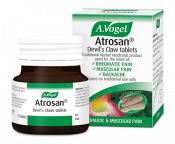How does diet affect pain?
Although chronic pain is a complicated issue, research has recently begun to delve into the effects of diet on it. To help understand if diet can improve chronic pain this blog looks at:
- What is chronic pain
- The link between diet and pain
- Foods to help chronic pain
- Foods that may exacerbate chronic pain.
What does chronic pain mean?
According to the NHS, pain is defined as chronic when it persists for 12 weeks or more, despite measures to treat and manage it.3 Acute pain, on the other hand, is the term used to describe immediate, short-term pain that is caused by falling off your bike and scraping your knee, for example.
The brain receives signals of pain via nerves that run along the inside of the spine. These make up the central nervous system. Once it receives these signals, the brain must work out what the strength of the pain is. Eventually, we'd expect these signals to die away and the pain to dim as well. However, on occasion, the brain will continue to send out pain signals even if there is no obvious reason to do so.
Some examples of chronic pain include:
Unfortunately, in many cases, it can be very difficult to find a reason for chronic pain, though it can be triggered by an operation or an old injury. Issues like stress and diet are thought to have some influence.
Can diet improve chronic pain?
A recent study has suggested that dietary changes could have a positive influence on chronic pain.4
This research split a group of adults with chronic pain into four separate groups. They were treated with various scenarios including dietary consultation, supplementation with fruit juice, or supplementation with a placebo fruit juice. There was also a control group that initially received no treatment. Researchers measured things like pain level, quality of life and dietary intake for a period of 6 weeks.
The results were very positive – all groups had reduced pain levels and a better quality of life. Those in the dietary consultation group also had significantly better pain outcomes compared to those in the control group.
Although the study above does clearly show that dietary changes can have a positive effect on chronic pain, we must acknowledge that it was a small piece of research and more work is therefore needed on the topic.
The good thing about this study, however, is that even small changes were seen to have a positive effect on chronic pain.
My Top Tip:

This herbal remedy can be used to address back pain, muscle pain, rheumatic pain and joint pain.
"Easy to take and have noticed some relief after a few weeks of taking."

What should I eat for chronic pain?
Chronic pain is complicated and, if you suffer from it, it's very likely you have already spoken to various doctors and tried different pain-relieving medications. Therefore, I wouldn't blame you if you are a little sceptical about the influence of diet. So, let's look in a little more detail about how exactly it could help chronic pain.
First off, you may want to consider including more foods that offer anti-inflammatory benefits in your diet.
When you're injured, white blood cells are sent by the immune system to repair the affected area. Once it's been treated, inflammation will usually die down. However, sometimes the immune system stays on alert after the problem has been cleared up, which makes inflammation a chronic problem. This can damage cells over time, causing pain, heat, swelling and stiffness.
Recently, a study found that capsinoids from a sweet pepper could offer anti-inflammatory benefits in older and inactive adults.5 This is interesting, as this group may be more likely to experience chronic pain – according to Versus Arthritis, musculoskeletal conditions are most common in the 75-84-year-old age group.6
This study also found that sweet pepper consumption could reduce body fat mass, promote metabolism and improve chills or cold hypersensitivity, so there's added benefit to including them in your diet!
Foods that are commonly included in the Mediterranean diet, such as legumes, nuts, seeds, whole fruits, dark leafy green vegetables and wholegrains, are also associated with numerous health benefits.
These kinds of foods contain antioxidants known as polyphenols, which have anti-inflammatory effects. They also contain an array of nutrients to keep the body fuelled and functioning. This makes them a useful tool for helping to reduce and manage painful flare-ups.
For more anti-inflammatory foods, take a look at my blog '8 inflammation-fighting foods for your muscles and joints'.
Tips for chronic pain sufferers:
|
Which foods make chronic pain worse?
Foods that can worsen chronic pain will, to some extent, depend on where your pain is focused. For example, eating a lot of citrus fruits (as we may be more likely to do in the summer when there is more of this fruit available) has been known to exacerbate joint pain.
Nowadays, many diets contain large quantities of meat and refined grain products like white bread and white rice. Our consumption of dessert products is also high – this includes things like biscuits, sweets and cake. All of these can trigger and worsen inflammation and, given that inflammation can be a factor in chronic pain, we should aim to limit our intake of them.7
Results: Do you suffer from chronic pain?

References
2 https://assets.publishing.service.gov.uk/governent/uploads/system/uploads/attachment_data/file/829777/PHE_PMR_report.pdf
4 https://www.ncbi.nlm.nih.gov/pubmed/30654479







